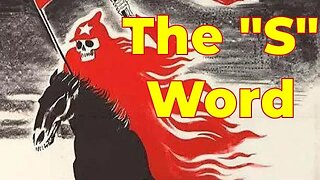Premium Only Content

European Union Collective – Christopher Story – Part 1.7 – Europe From the Atlantic to Vladivostok
Christopher Story "died under mysterious circumstances" after writing this book. He was an adviser on intelligence matters to Prime Minister Thatcher and published Soviet Analyst for many years. In the opinion of many he was better informed than British and US intelligence organisations put together. This book is a daring analysis of the plans of two major players in the battle for Europe's destiny. One is Germany and the dream of a Pan-Germany. The other is Russia, which had plans since the Soviet era.
In our days, the EU is seen as an enemy of the nations it comprises, thus Christopher Story thinks. He is able to see a "German and Russian strategy to complete Lenin's World Revolution.
https://www.amazon.com/European-Union-Collective-Member-States/dp/1899798013
https://www.goodreads.com/en/book/show/9976147-european-union-collective
Notes and references:
68. 'Obschaya Gazeta', No. 23, June 1995, remarks by Oleg Poptsov, Director, Second Russian National TV Channel, cited in 'Soviet Analyst', Volume 23, Number 5, page 11.
69. Remarks by Grigory Yavlinski in a feature published in The Financial Times', London; cited in 'Russia Reform Monitor', American Foreign Policy Council, Washington, DC. No. 225,5th February 1997. The Leninist implementers' use of candour to attract Western sympathy and support, masks an intent to deceive; indeed, wherever unsolicited candour from Soviet players is in evidence, the Western observer should be on guard for lies. Candour contains truth, but reveals it for strategic or disinformation purposes, or both, and usually precedes a lie. Grigory Yavlinski's pose as a 'liberal reformer' [see Case Study 3, page 108] was hollow from the moment he appeared on the stage and ingratiated himself internationally as
(briefly) the favoured 'whizzkid' of the future. His dialectical-strategic collaboration with Yevgeniy Primakov in Washington,
described in the Case Study, revealed him to have been a key 'second echelon' Leninist operative who had been selected
for his smooth charm, which is a particular characteristic of the 'new wave' of Soviets, such as the well-dressed and personable Sergei B. Ivanov, the Russian Defence Minister under President Putin. To illustrate Yavlinski's mentality, consider the following remark by Yavlinski on the BBC's 'Money Programme' on 20th September 1998, in the context of the Russian financial crisis. In his comments, Yavlinski actually threatened the West in true Bolshevik fashion, in an oblique demand for 'emergency finance': 'I'm not blackmailing you', he said. 'You know the map. You can see where Britain is on the map, where North America is, where Europe is. You can make your own decisions'. See also main text.
70. The statement by Mr R. James Woolsey, former Director of Central Intelligence, was released on 3rd November 1996 as a Press Release by the Dole Campaign in Washington. See 'Soviet Analyst', Volume 24, Number 2, page 24.
71. See 'Soviet Analyst', Volume 24, Number 2, page 24, December 1996
72. 'Komsomolskaya Pravda', embracing the word Komsomol, the Communist youth organisation, cited in 'International
Herald Tribune', 15th April 1994.
73. The Washington Times', 7th June 1994; article following the murder of Kvantrishvili.
74. 'Un pays sacrifie', 'Libre Journal', Paris, Number 26, 1995, page 29.
75. The Perestroika Deception', Anatoliy Golitsyn, op. cit, Memorandum to the CIA dated 27th September 1993, The Cost of Misplaced Trust', pages 215-216.
76. Armand Hammer was one of the most prominent agents of influence recruited under Lenin. Hammer hired Senator Albert Gore, following his departure from the Senate, to run the coal subsidiary of Occidental Petroleum. Senator Gore's son, Vice-President Al Gore, was appointed to serve as the opposite number to the Leninist Russian Prime Minister,
Viktor Chernomyrdin, a key Leninist strategist and implementer as already shown, on a joint US-Russian Commission, under President Clinton. Joint Commissions have been used, especially by the United States, for many years as a means of enhancing bilateral relations.
77. Remarks of Arkadiy Volskiy, a top strategist and member of Yeltsin's supragovernmental Security Council, a locus of the strategic collective, reported in 'Izvestia', 21st September 1994, page 9, cited in 'Soviet Analyst', Volume 23, # 5.
78. For an outline of the 'global justice system' agenda as it had emerged by the mid-1990s, see Soviet Analyst', Volume 23, Number 5, pages 9-13. Remarks by the former Interior Minister, Viktor Yerin, 'International Affairs', journal of the Russian Foreign Ministry, Volume 41, Number 7,1995.
79. Remarks by General Aleksandr Lebed cited at 5.00pm on US National Public Radio, 27th July 1996, just ten daysfollowing the mysterious destruction of TWA Flight 800: see 'Soviet Analyst', Volume 24, Number 5, page 1.
#EuropeanUnion #Collectivism #Deception
-
 1:10:22
1:10:22
Eugen Richter Audiobooks
1 year agoAbout the “S” Word: A Polemic – J.R.Nyquist Blog
1.34K -
 1:37:40
1:37:40
The Quartering
3 hours agoShutdown Watch, Biden Dementia Bombshell, Madison Shooter Had An Accomplice & Much More!
24.5K9 -
 26:58
26:58
Stephen Gardner
1 hour ago🔥The Trump-Musk fight EXPLAINED, HUGE White House COVER-UP EXPOSED, Congress Tried To SCREW America!
7.65K11 -
 LIVE
LIVE
Right Side Broadcasting Network
8 days agoLIVE: TPUSA's America Fest Conference: Day Two - 12/20/24
4,869 watching -
 1:51:08
1:51:08
Tucker Carlson
4 hours agoJenner Furst: Secret Chinese Biotech Programs, and the Documentary That Could Put Dr. Fauci in Jail
85.3K64 -
 9:39
9:39
Film Threat
5 hours agoNOSFERATU | Film Threat Reviews
9.17K1 -
 14:33
14:33
IsaacButterfield
11 hours ago $1.99 earnedINSANE WOKE MEN OF TIKTOK!
19.7K12 -
 1:58:16
1:58:16
The Charlie Kirk Show
3 hours agoAmericaFest: Day 2 | Beck, McKoon, Steele, Nagao, Galaszewski, Bowyer, Brown, Amanchukwu | 12.20.24
77.9K3 -
 54:15
54:15
The Dan Bongino Show
6 hours agoSaving The U.S. Military w/ SEAL Andy Stumpf (Ep. 2392) - 12/20/2024
529K775 -
 2:53:55
2:53:55
The Dana Show with Dana Loesch
3 hours agoGOVERNMENT SPENDING BILL FAILS | The Dana Show LIVE On Rumble!
15.8K6